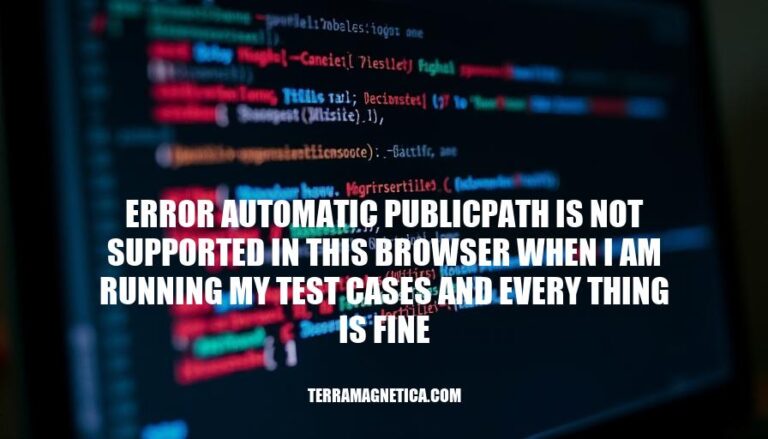


When running test cases, developers might encounter the error message “automatic publicPath is not supported in this browser.” This issue typically arises in older browsers that lack support for certain modern JavaScript features used by tools like webpack. The error indicates a compatibility problem where the browser cannot automatically determine the public path for assets, which is crucial for loading resources correctly during testing and development. Understanding and resolving this error is essential for ensuring smooth and consistent test execution across different environments.
The error “Automatic publicPath is not supported in this browser” typically occurs when using Webpack 5 with dynamic imports in a testing environment like Cypress or Jest. This error arises because Webpack’s publicPath setting, which determines the base path for all assets within your application, is set to “auto.” This setting relies on document.currentScript to dynamically determine the path at runtime. However, not all browsers support document.currentScript, leading to this error.
Dynamic Imports: When your code includes dynamic imports (e.g., import('./module')), Webpack needs to know the base path to load these modules. If publicPath is set to “auto,” Webpack tries to determine this path automatically using document.currentScript.
Browser Compatibility: The document.currentScript property is not supported in all browsers, particularly older ones or those with JavaScript disabled. This lack of support causes Webpack to fail in determining the correct path, resulting in the error.
Polyfills: In environments where document.currentScript is not supported, a polyfill is required to provide this functionality. Without it, the automatic determination of publicPath fails.
Test Failures: The error causes test cases to fail because the necessary modules cannot be dynamically imported. This failure is detected by testing frameworks like Cypress or Jest, which then report the error.
Debugging Complexity: Since the error originates from the test environment’s configuration rather than the application code, it can be challenging to debug. Developers might spend significant time identifying the root cause, especially if they are not familiar with Webpack’s configuration nuances.
Workarounds and Fixes: To resolve this issue, you can explicitly set the publicPath in your Webpack configuration to a fixed value or an empty string. This approach bypasses the need for automatic path determination and ensures compatibility across all browsers.
Here’s an example of how to set the publicPath:
module.exports = {
output: {
publicPath: '',
},
};
By addressing this configuration, you can ensure that your tests run smoothly without encountering the “Automatic publicPath is not supported in this browser” error.
Here are the common causes and scenarios for the “Automatic publicPath is not supported in this browser” error:
Dynamic Imports with Webpack v5:
publicPath configuration.Browser Compatibility Issues:
Incorrect Webpack Configuration:
publicPath in your Webpack configuration.webpack.config.js with an incorrect or missing publicPath setting.publicPath to resolve dynamic imports properly.JavaScript Disabled in Browser:
Using Webpack v5 with Cypress:
publicPath.Third-Party Packages:
publicPath settings.These scenarios and configurations can lead to the “Automatic publicPath is not supported in this browser” error. Adjusting your Webpack configuration or ensuring compatibility with your test environment can help resolve these issues.
: https://github.com/cypress-io/cypress/issues/18435
: https://github.com/jestjs/jest/issues/14417
: https://lxadm.com/automatic-publicpath-is-not-supported-in-this-browser/
: https://htmlgenie.net/webpack5-automatic-publicpath-is-not-supported-in-this-browser/
Sure, here are the steps to troubleshoot and resolve the ‘error automatic publicPath is not supported in this browser’:
Locate your webpack configuration file:
webpack.config.js.Open the file in a text editor.
Find the output object within the configuration.
Set the publicPath property to the appropriate value:
module.exports = {
// ...
output: {
// ...
publicPath: '/assets/', // Adjust this path as needed
},
// ...
};
Save and close the file.
Rebuild your project using the webpack command or your preferred build tool.
Test your project in the browser to confirm the error has been resolved.
To avoid encountering the ‘Automatic publicPath is not supported in this browser’ error in the future, follow these preventive measures and best practices:
Explicitly Set publicPath:
webpack.config.js, set the publicPath property explicitly within the output object.module.exports = {
output: {
publicPath: '/assets/', // Adjust this path as needed
},
};
Use publicPath: 'auto':
publicPath to 'auto' to let webpack determine the correct path.module.exports = {
output: {
publicPath: 'auto',
},
};
Polyfill for currentScript:
document.currentScript to ensure compatibility with older browsers.import 'current-script-polyfill';
Browser Compatibility:
currentScript.Webpack Configuration:
const webpackPreprocessor = require('@cypress/webpack-preprocessor');
module.exports = (on, config) => {
on('file:preprocessor', webpackPreprocessor({
webpackOptions: {
output: {
publicPath: 'auto',
},
},
}));
};
Environment Variables:
module.exports = {
output: {
publicPath: process.env.NODE_ENV === 'production' ? '/prod-assets/' : '/dev-assets/',
},
};
By implementing these measures, you can prevent the ‘Automatic publicPath is not supported in this browser’ error and ensure smoother test runs.
To resolve the ‘Automatic publicPath is not supported in this browser’ error, it’s essential to understand its causes and implement the necessary fixes.
The error occurs when the browser doesn’t support dynamic imports with automatic public path determination. To address this issue, you can explicitly set the `publicPath` property within the `output` object in your webpack configuration file.
Alternatively, use `publicPath: ‘auto’` to let webpack determine the correct path for dynamic imports.
Additionally, ensure that your test environment uses browsers that support ES6 and newer features, as older browsers may lack support for `currentScript`.
It’s also crucial to include a polyfill for `document.currentScript` to maintain compatibility with older browsers.
Regularly updating your webpack and related dependencies is essential to benefit from bug fixes and improvements.
Finally, use environment variables to manage different configurations for development and production environments.
By implementing these measures, you can prevent the ‘Automatic publicPath is not supported in this browser’ error and ensure smoother test runs.